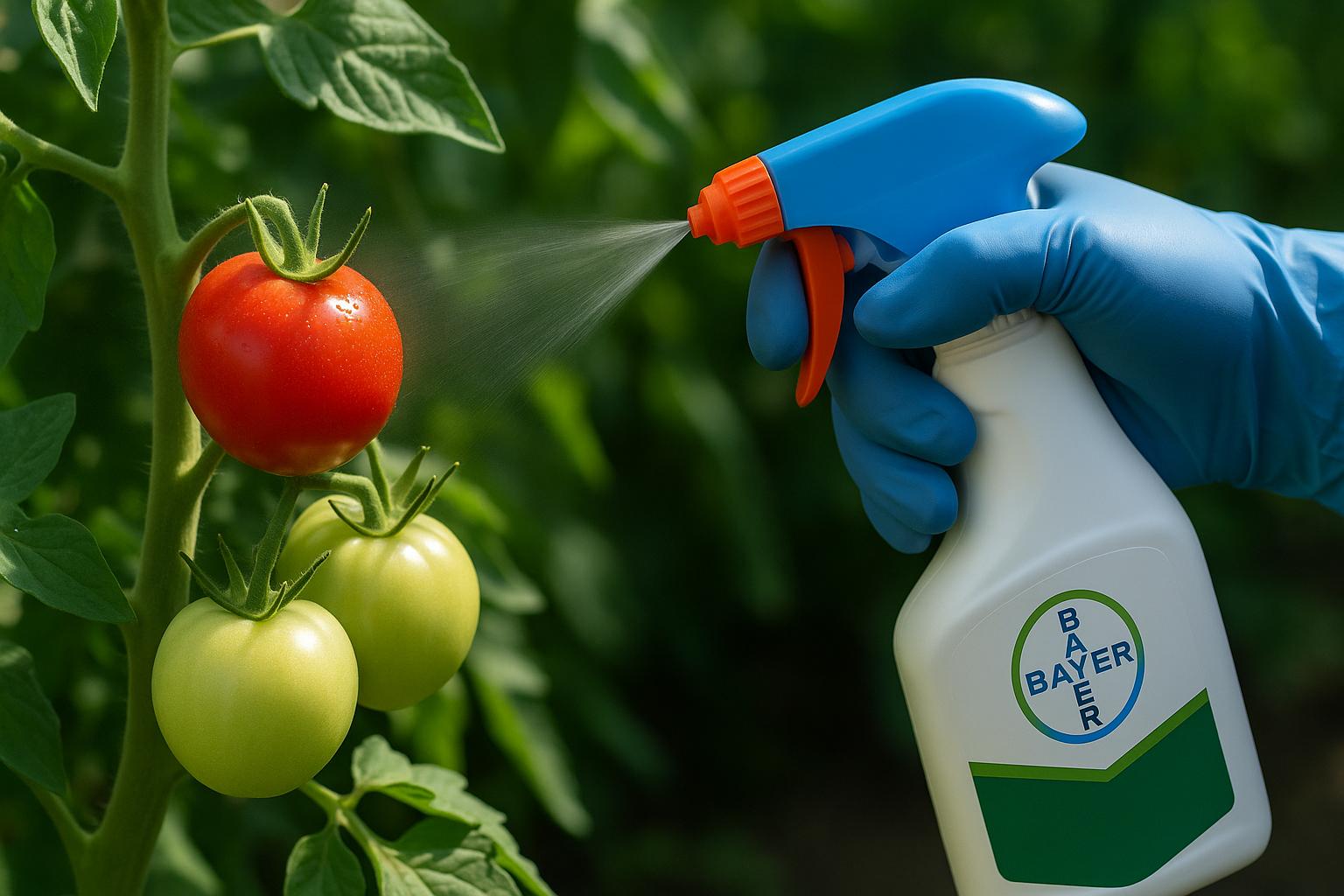Bayer Acerbo is a systemic fungicide combining Fluopyram 21.37% and Trifloxystrobin 21.37% SC. This dual-action formulation is designed to combat a range of fungal diseases by being absorbed into plant tissues, offering both protective and curative effects. Its primary applications are for crops such as rice, chilies, and onions, targeting diseases including leaf and neck blast, powdery mildew, and anthracnose.
The product is applied as a foliar spray, with the first application recommended at the onset of disease symptoms, followed by subsequent applications at 10–12 day intervals, depending on disease severity.
Assessing the Suitability for Fruit-Bearing Plants
While Bayer Acerbo is effective for certain crops, its use on fruit-bearing plants requires careful consideration. The product label specifies its application for rice, chilies, and onions, and does not mention fruit trees. Using it on unlisted crops may lead to unintended consequences, including potential phytotoxicity or residue issues.
Moreover, the product is toxic to fish and aquatic invertebrates, necessitating caution to prevent contamination of water bodies. This environmental consideration further underscores the importance of adhering to recommended usage guidelines.
For those seeking fungicidal solutions for fruit-bearing plants, it’s advisable to consult products labeled explicitly for such use. For instance, Bayer’s Buono fungicide is formulated for crops such as fruits, vegetables, and cereals, offering protection against diseases like yellow rust and powdery mildew.
Real-World Application: A Case Study
In a recent instance, a grower applied Bayer Acerbo at the petal fall stage on M27 apple trees and observed positive outcomes in controlling diseases like Alternaria and scab.
However, such anecdotal evidence should be approached with caution. While the results were favorable in this case, they do not guarantee similar outcomes in all cases. Factors such as tree variety, local climate, and disease pressure can significantly impact efficacy.
Regulatory and Safety Considerations
It’s crucial to recognize that using pesticides outside their labeled recommendations can have legal and safety implications. Regulatory bodies establish guidelines based on extensive research to ensure both the efficacy and safety of products for consumers and the environment.
Applying Bayer Acerbo to fruit-bearing plants not listed on its label may result in residue levels exceeding permissible limits, posing health risks to consumers and potentially leading to legal consequences for growers.
Alternative Solutions for Fruit-Bearing Plants
For those seeking fungicidal options for fruit crops, several products are specifically formulated and labeled for use on such crops. These alternatives are designed to address the unique challenges of fruit cultivation, ensuring both effectiveness and compliance with safety standards.
- Serenade ASO: A bio-fungicide based on Bacillus subtilis, effective against diseases like moniliosis and bacteriosis in cherries and other fruit crops. cherrytimes.it
- Teldor: A fungicide for controlling Botrytis (grey mould) on strawberries, raspberries, and other berries. bayercropscience.ie
These products offer targeted solutions for fruit-bearing plants, aligning with both agronomic needs and regulatory requirements.
Expert Insight
“The right tool for the right job is essential in agriculture. Using products as intended ensures both crop health and consumer safety.”
FAQs
Q: Can I use Bayer Acerbo on my apple trees?
A: Bayer Acerbo is not labeled for use on apple trees. Applying it to unlisted crops can lead to unintended consequences and may not comply with safety regulations.
Q: Are there fungicides specifically for fruit-bearing plants?
A: Yes, products like Serenade ASO and Teldor are formulated for use on fruit crops, offering effective disease control while adhering to safety standards.
Q: What should I consider before applying any fungicide to my fruit plants?
A: Always consult the product label to ensure it’s approved for your specific crop. Consider factors like disease pressure, environmental conditions, and pre-harvest intervals to ensure both efficacy and safety.
Final Thoughts
Although Bayer Acerbo is an effective fungicide for some crops, it is not advised to use it on fruit-bearing plants because of possible safety issues and a lack of specific labelling. Growers who want to guarantee efficient disease control and adherence to safety regulations should choose products specifically made for fruit crops.
Consult reputable agronomic experts or agricultural extension agencies for additional information on appropriate fungicides for fruit-bearing plants.




